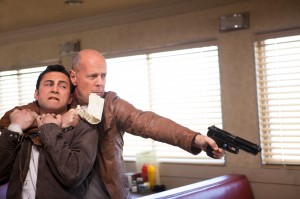Rian Johnson’s “Looper” runs off the residual petrol of past sci-fi vehicles but manages to assemble an engaging story characterized by terse professionalism across both cast and crew. Time travel, that immortal science-fiction narrative convention, factors into the movie’s events, but seems less a central topic of intrigue than a plot gimmick to set up moral tension and vigorous action set-pieces.
The cinematography is lean, the transitions rapid, the sound design booming and the performances compelling yet straightforward. Curiously, it’s the movie’s no-nonsense neatness that sets “Looper” apart from messier genre counterparts, but the film doesn’t invest its energy in fleshing out a distinctive style, instead integrating its moments of brilliance into the clockwork of what amounts to an effective genre exercise.
The movie opens in the “present” — not the viewer’s present, but the dilapidated, crime-ridden present of 2044. Scenes of poverty overlap with the roaring red of a luxury sports car driven by Joe (played by the ever-popular Joseph Gordon-Levitt), a mob assassin of a special order whose job description requires that he dispatch targets sent back from the future by the mob of 2074.
“Time travel hasn’t been invented yet,” Joe informs us via voice-over. “But thirty years from now, it will have been.”
Known as loopers, Joe and his outfit ensure that the consequences of murder for the future mob disappear beneath the folds of the space-time continuum. All is (ostensibly) well until one day the future mob sends back Joe’s future self (played by Bruce Willis) for present Joe to kill. The execution goes awry and future Joe escapes. Now, both Joes are on the run — the future Joe from the present Joe and both from the present mob, and a fairly typical, but fun, chase movie ensues.
But let’s rewind to the beginning of “Looper” and one of the film’s strongest segments. It exhibits a futuristic vision and, if the film doesn’t quite reach that, then at least an admirable attempt at one. From the very first shot, the movie absorbs us into an urban environment of jarring violence; the casually brutal way in which Joe deals out death fosters a perverse exhilaration. Smog and smut suffuse the city streets to create the impression of dystopia; rapid-fire montages convey a life of cold, ruthless efficiency for the loopers, a life punctuated by reckless driving and bouts of drug-charged debauchery at local nightclubs. The lighting feels putrid, the air artificial and the world abandoned.
Such a vivid setting ought to spend more time beneath the camera’s gaze, but “Looper” dashes by its locales with hardly a few passing glances. With many shots stripped down to just two or three seconds in length, much of the movie’s editing scheme feels hurried and impatient much like many of today’s action pictures.
Though the movie is ultimately about motion rather than scenic admiration, longer takes could have helped establish the film’s time and place, grounding the story events in a tangible setting. On the topic of action, consider also how “Looper’s” potentially high concept sensibilities give way to numbing gunplay across multiple scenes, yet another convention among today’s blockbuster cinema. Though to be expected, these scenes tend to become tedious and thus detract from the overall experience of the movie.
Much attention has been directed at Gordon-Levitt’s semblance to a younger Bruce Willis in “Looper,” and for good reason. On the one hand, the startling likeness speaks volumes of both Gordon-Levitt’s performance and his makeup job. Initially bearing virtually no resemblance to the older action star, Gordon-Levitt uncannily adopts Willis’ iconic mannerisms, from husky growl to clenched muscles around the mouth. Makeup completes the illusion, most noticeably with a pair of steely gray contacts inserted over Gordon-Levitt’s brown eyes. On the other hand, the two actors look nothing like each other. It’s obvious that the studio really wanted one of today’s hottest young actors in the movie and thus bypassed basic logic to bring him on board.
When dealing with time travel, however, logic can sometimes transcend the basic; the low-budget sci-fi stunner “Primer” is a case in point. Considering all the paradoxes and cosmic enigmas associated with the concept of time traveling, “Looper” is actually fairly rudimentary in comparison with that film or even last year’s “Source Code,” which also targeted a mainstream audience.
For one thing, we are never told how, why or by whom time travel will be developed, only that it will exist sometime in the future. That aside, the movie’s depiction of time travel is still largely linear and rather simplistic; from the start, Joe’s voice-over narration lays things out definitely and clearly for us, eliminating much of the fascination that comes with uncertainty. Indeed, time travel recedes farther and farther into the backdrop as the movie progresses, becoming up until the end little more than a stage on which the other parts of the film can unfold.
With two episodes of AMC’s “Breaking Bad” and two feature length films under his belt, Johnson has been on a steady rise. Looper, though not quite fulfilling its potential, marks Johnson as a formidable director and reasserts Gordon-Levitt as one of the most versatile and appealing actors working today.
The film itself is a worthy addition to the repertoire of time travel movies, boasting both craft and charisma if not all the complexity possible with the subgenre.
Jeng is a member of the class of 2016.



